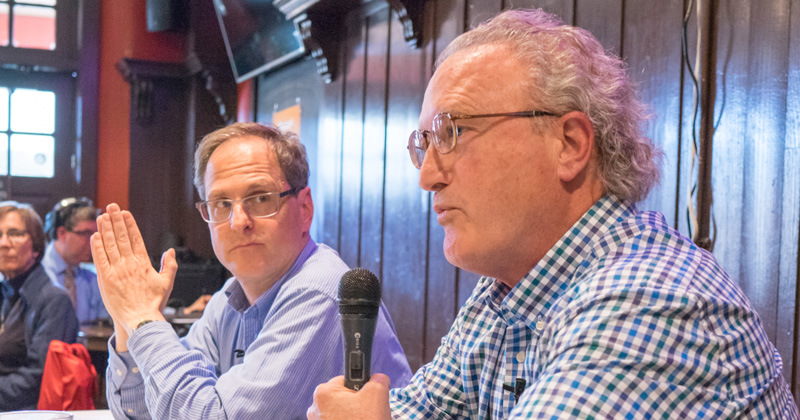


Experts urge caution on Korea
Photo by Eric Ruth April 19, 2018
Professor, author see few options for a low impact and satisfying military resolution
What does the United States stand to gain by negotiating with North Korea? Not nearly as much as it has to lose, two experts suggested on Monday, April 16.
The staffs of President Donald Trump and North Korean leader Kim Jong-un are negotiating a meeting. But a summit between two adversaries on short notice rarely works out well, said University of Delaware Professor Stuart Kaufman. He recalled the 1961 meeting between President John Kennedy and Russian Premier Nikita Khrushchev, which “went so well, the result was the Cuban Missile Crisis.”
Kaufman discussed the escalating global tensions at the Deer Park Tavern as part of a “Front Page Café” event co-sponsored by the Journalism program and the Departments of Political Science and International Relations. He spoke alongside veteran journalist and former UD faculty member Mark Bowden, whose July 2017 cover story for The Atlantic explored “How to deal with North Korea,” and found no good options—though “some are worse than others.” The podcast of the event is on Delaware Public Media.
Referring to the North Koreans, Bowden said, the United States could “wipe out their regime, destroy their arsenal, defeat their military. But then the world would be left with the largest humanitarian tragedy in modern times.
“If you thought Iraq was difficult to govern,” he continued, “imagine a mountainous country with pockets of loyalists in possession of weapons—possibly dirty, biological ones.”
Kaufman, who jokingly referred to himself as Dr. Doom-and-Gloom, presented his own “most optimistic possible scenario, if the U.S. were to bomb North Korea,” in which the response would include conventional or even chemical weapons, not nukes.
Both agreed, with measured optimism, that the stakes are too high for either side to start a nuclear war.
As Bowden put it, “It’s contrary to his own interests for Kim Jong-un to trigger a nuclear option.”
“North Korea has played the same game very well for 40 years—not by luck and not by being crazy, but by being rational,” said Kaufman. “[Jong-un] wants to breathe and he wants to rule, and he just wants the United States to accept him.”
But what that means for a meeting between the leaders is yet to be determined.
“In principle, you make threats to get the other side to the table, and then negotiate,” Kaufman said. “In reality, there’s no chance they’ll give up their nuclear arsenal. And if North Korea thinks we’re going to institute a regime change, they have no reason for restraint.”
And though “the idea that [Trump and Kim] would talk is hopeful,” Bowden worried of America “getting played” on the world stage.
“This meeting is being orchestrated by Pyongyang,” he said, “not by Washington.”
Contact Us
Have a UDaily story idea?
Contact us at ocm@udel.edu
Members of the press
Contact us at 302-831-NEWS or visit the Media Relations website

